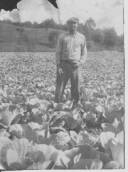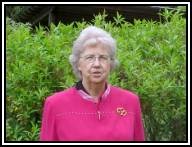|
Otealia Baldwin was born
in Asheville, North Carolina but grew up in the Nantahala area
of Macon County. She lived with her grandmother in a four room
farm house. Her home place consisted of a barn and pastureland
where they raised chickens, hogs, and cows. Her grandparentís
main livelihood before the construction of the Nantahala Lake
and dam was farming. However, when she was thirteen years old
she and her family were forced off of their own land because of
the construction of Nantahala Dam and were relocated onto two
acres of land that they owned above the waterline. She claims
that they were very fortunate to have owned land above the waterline.
Being displaced brought great changes. Owning only owned two acres
of land they could not rely on farming as they once did before
the lake and the dam. When asked how much her family was paid
for their land, she replied: "Very little."

She relates that her entire community was disrupted when they
were forced to relocate. Some individuals moved to surrounding
communities and counties while others even moved to different
states. Not only were families and home places effected but general
stores, post offices, filling stations, corn mills, schools and
churches had to move as well. However, the thought of obtaining
electricity helped the relocation process because they all knew
that the end result would be electrification throughout the area.

Otealia remembers the community before the dam construction as
a nice and lively community where everybody farmed. "It was
just a nice community,"she states."Memories of the land clearing are very
sad, especially when they brought in their machinery and chainsaws
to cut down all of the timber, demolish the houses and clear the
land." Otealia
says that this was a period that was, "very sad and destructive,
words cannot describe how it looked and made me feel." She
also relates that rural electrification totally uprooted the community
and scattered everybody. "Many individuals lost contact with
friends due to relocation and displacement."
However, she claims that electricity was a much needed resource
and that they were all glad to get it. She claims that it was
good feeling to have electric lights in her home. The radio was
also a wonderful change that electricity brought into their homes.
Before electricity they had to listen to the radio with the use
of a car battery. She says that "electricity definitely
made life easier," the electric washing machine is
one time saver that she mentions.
Most families in the Nantahala area received electricity about
the same time as those in surrounding communities. Electricity
became available when the wires came through to everyone. She
relates that a lot of people just naturally learned how to wire
their own homes by just teaching themselves. She claims that the
atmosphere was very positive throughout the area because they
were all so glad to get the electricity. Local community men would
usually install wires throughout the communityís homes.
There are times that Otealia wishes that the lake which covers
a wonderful community would just go away. However, she states
that "electricity has really helped us!!!"
|


